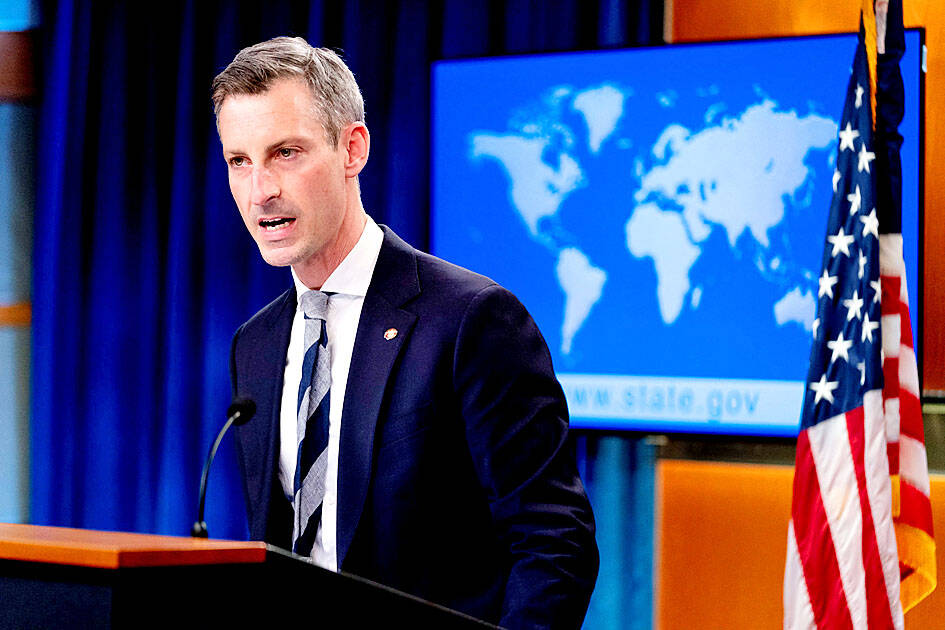US Department of State spokesman Ned Price on Monday said that Washington does not take a position on the sovereignty issue between Taiwan and China, a position not often explicitly stated by US officials.
Price was responding to a question at a news briefing on whether Washington’s “one China” policy supported the belief that “Taiwan is part of China and that the US respects Chinese territorial integrity and sovereignty over Taiwan.”
The US “does not take a position on sovereignty,” Price said, adding that Washington’s “one China” policy has not changed and has been at the crux of the US’ approach to Taiwan since 1979, when the US’ Taiwan Relations Act went into effect.

Photo: Reuters
That is a position that US Secretary of State Antony Blinken “made very clear in private” to Chinese Minister of Foreign Affairs Wang Yi (王毅) when the two met on Friday, Price said.
He did not further define the US’ “one China” policy, but said that the US wanted to see the “status quo” in the Taiwan Strait continued and preserved, as it had undergirded peace and stability in the region for more than 40 years.
China, which has become more “coercive and intimidating in its actions and maneuvers across the Taiwan Strait,” apparently does not share the same hope, he added.
Beijing has accused the US of hollowing out its “one China” policy and supporting Taiwan’s independence, and has stepped up military maneuvers near Taiwan, most notably after US House of Representatives Speaker Nancy Pelosi visited Taipei early last month.
It has been Washington’s long-standing policy to not take a position on Taiwan’s sovereignty, but US officials have rarely made known that stance publicly.
One such instance was when then-Pentagon press secretary John Kirby at a news conference on Oct. 12 last year spoke about the difference between the US’ “one China policy” and Beijing’s “one China principle.”
The US has long abided by its “one China policy,” which is distinct from Beijing’s “one China principle,” which asserts sovereignty over Taiwan, Kirby said at the time.
The US “takes no position over the sovereignty of Taiwan or on sovereignty over Taiwan,” Kirby said.
In May, Price wrote on social media that the US abides by its “one China” policy and does not subscribe to China’s “one China” principle, criticizing China for “continuing to publicly misinterpret the US’ policy.”

ENDEAVOR MANTA: The ship is programmed to automatically return to its designated home port and would self-destruct if seized by another party The Endeavor Manta, Taiwan’s first military-specification uncrewed surface vehicle (USV) tailor-made to operate in the Taiwan Strait in a bid to bolster the nation’s asymmetric combat capabilities made its first appearance at Kaohsiung’s Singda Harbor yesterday. Taking inspiration from Ukraine’s navy, which is using USVs to force Russia’s Black Sea fleet to take shelter within its own ports, CSBC Taiwan (台灣國際造船) established a research and development unit on USVs last year, CSBC chairman Huang Cheng-hung (黃正弘) said. With the exception of the satellite guidance system and the outboard motors — which were purchased from foreign companies that were not affiliated with Chinese-funded

PERMIT REVOKED: The influencer at a news conference said the National Immigration Agency was infringing on human rights and persecuting Chinese spouses Chinese influencer “Yaya in Taiwan” (亞亞在台灣) yesterday evening voluntarily left Taiwan, despite saying yesterday morning that she had “no intention” of leaving after her residence permit was revoked over her comments on Taiwan being “unified” with China by military force. The Ministry of the Interior yesterday had said that it could forcibly deport the influencer at midnight, but was considering taking a more flexible approach and beginning procedures this morning. The influencer, whose given name is Liu Zhenya (劉振亞), departed on a 8:45pm flight from Taipei International Airport (Songshan airport) to Fuzhou, China. Liu held a news conference at the airport at 7pm,

Taiwan was ranked the fourth-safest country in the world with a score of 82.9, trailing only Andorra, the United Arab Emirates and Qatar in Numbeo’s Safety Index by Country report. Taiwan’s score improved by 0.1 points compared with last year’s mid-year report, which had Taiwan fourth with a score of 82.8. However, both scores were lower than in last year’s first review, when Taiwan scored 83.3, and are a long way from when Taiwan was named the second-safest country in the world in 2021, scoring 84.8. Taiwan ranked higher than Singapore in ninth with a score of 77.4 and Japan in 10th with

GRIDLOCK: The National Fire Agency’s Special Search and Rescue team is on standby to travel to the countries to help out with the rescue effort A powerful earthquake rocked Myanmar and neighboring Thailand yesterday, killing at least three people in Bangkok and burying dozens when a high-rise building under construction collapsed. Footage shared on social media from Myanmar’s second-largest city showed widespread destruction, raising fears that many were trapped under the rubble or killed. The magnitude 7.7 earthquake, with an epicenter near Mandalay in Myanmar, struck at midday and was followed by a strong magnitude 6.4 aftershock. The extent of death, injury and destruction — especially in Myanmar, which is embroiled in a civil war and where information is tightly controlled at the best of times —